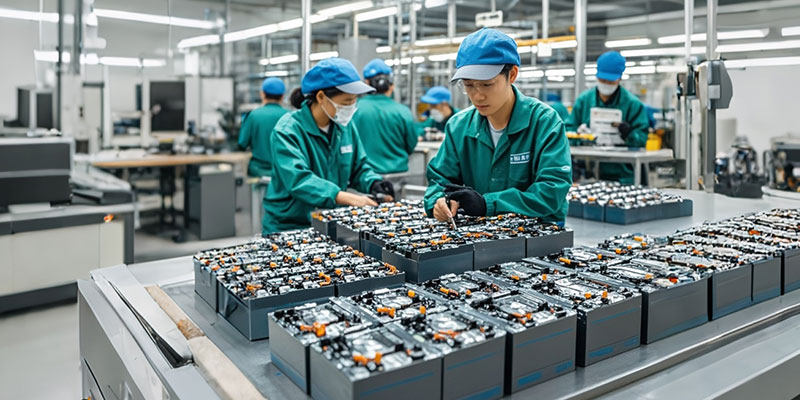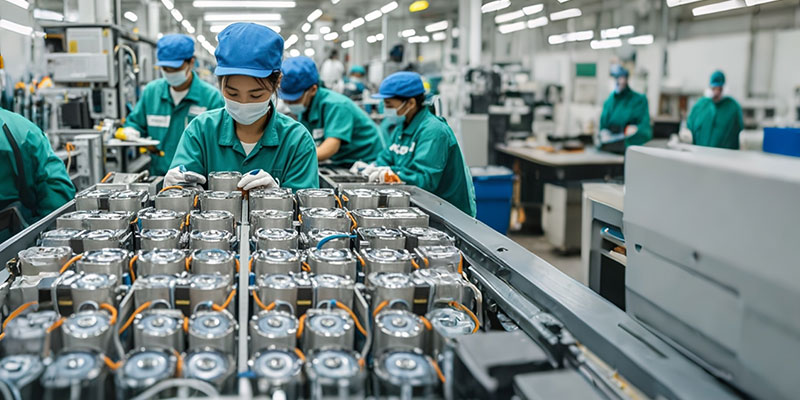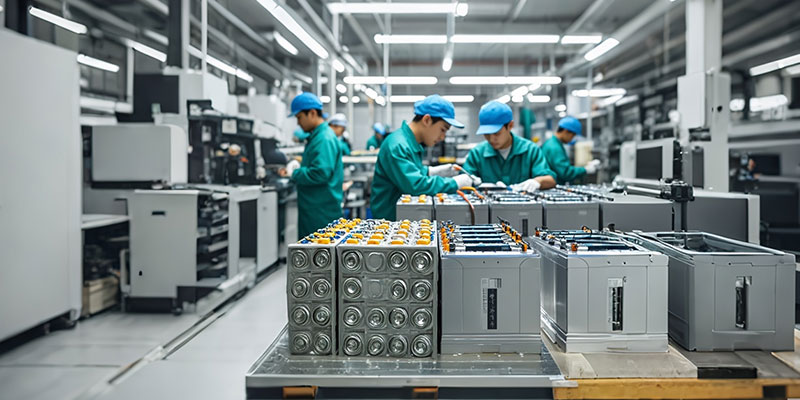Introduction
In an age where technology is advancing at an unprecedented pace, the demand for reliable and efficient batteries has never been higher. From electric vehicles to renewable energy storage, batteries play a crucial role in powering our daily lives. Modern battery factories are at the forefront of this revolution, employing cutting-edge technologies to enhance production efficiency, improve product quality, and promote sustainability. This article delves into the inner workings of a modern battery factory, showcasing the technologies that are shaping the future of battery manufacturing.

Structure of a Modern Battery Factory
Modern battery factories are designed with efficiency and innovation in mind. The layout of these facilities is carefully planned to facilitate streamlined production processes and effective workflow.
- Factory Layout and Design
- Production Lines: The factory typically features dedicated production lines for different types of batteries, such as lithium-ion and solid-state batteries. Each line is optimized for specific manufacturing processes.
- Clean Room Environments: Battery production requires a contamination-free environment. Clean rooms are equipped with specialized ventilation and filtration systems to maintain air quality and minimize dust and other contaminants.
- Key Production Areas
- Material Preparation: This area focuses on the preparation of raw materials, including electrode materials and electrolytes.
- Cell Assembly: Automated systems and robotics are used to assemble battery cells, ensuring precision and consistency.
- Testing and Quality Control: This section conducts rigorous testing to ensure that each battery meets the required performance and safety standards.
Application of Cutting-Edge Technology in Battery Manufacturing
The integration of advanced technologies has transformed the battery manufacturing process, making it more efficient and reliable.
- Automation and Robotics
- Automated Production Lines: Modern factories utilize automated systems to handle repetitive tasks, such as cell assembly and packaging. This reduces the risk of human error and increases production speed.
- Robotic Systems: Robots are employed in various stages of production, from assembling battery packs to conducting inspections. These robots are equipped with advanced sensors that allow them to perform complex tasks with high precision.
- Data Analytics and the Internet of Things (IoT)
- Data-Driven Decision Making: Factories leverage big data analytics to monitor production processes in real-time. By analyzing data from various sources, manufacturers can identify inefficiencies and optimize workflows.
- Real-Time Monitoring: IoT devices are used to monitor equipment health and performance. This allows for predictive maintenance, reducing downtime and enhancing overall productivity.
Advancements in Materials and Chemical Technology
The development of new materials and chemical technologies is pivotal to enhancing battery performance.
- Development of New Battery Materials
- Lithium-Ion vs. Solid-State Batteries: While lithium-ion batteries remain prevalent, solid-state batteries are gaining attention for their higher energy density and safety. Factories are investing in R&D to explore these advanced materials.
- Recycling and Resource Efficiency: Sustainable practices, such as recycling old batteries to recover valuable materials, are becoming integral to battery production.
- Green Manufacturing and Sustainability
- Environmental Impact Reduction: Modern factories implement eco-friendly manufacturing processes to minimize waste and reduce their carbon footprint.
- Sustainable Sourcing: Manufacturers are increasingly focused on sourcing materials responsibly to ensure the sustainability of their supply chains.
Quality Control and Safety Measures
Ensuring product quality and safety is paramount in battery manufacturing.
- Quality Monitoring During Production
- In-Line Testing: Real-time testing is conducted throughout the production process to identify defects early and ensure that each battery meets strict quality standards.
- End-of-Line Testing: Comprehensive testing is performed on finished products to verify performance metrics, such as capacity and discharge rates.
- Safety Standards and Risk Management
- Regulatory Compliance: Factories adhere to strict safety regulations and standards set by organizations such as UL and IEC.
- Risk Mitigation Strategies: Measures are in place to handle potential hazards, such as battery fires or leaks, ensuring a safe working environment.
Future Trends and Challenges
The battery manufacturing industry is rapidly evolving, and several trends are shaping its future.
- Future Developments in Battery Technology
- Advancements in Energy Storage: As the demand for renewable energy increases, innovations in energy storage technologies will play a crucial role in the grid stability and energy efficiency.
- Integration of Artificial Intelligence: AI is expected to revolutionize production processes, enhancing efficiency and enabling real-time optimization.
- Challenges Facing the Industry
- Supply Chain Disruptions: Global supply chain issues can impact the availability of raw materials, posing challenges for manufacturers.
- Regulatory Hurdles: As regulations evolve, manufacturers must adapt to new compliance requirements, which can impact production timelines and costs.
Himax Electronics Introduction
At Himax Electronics, we are committed to leading the charge in battery technology and innovation. With years of experience in the industry, our mission is to provide high-quality battery(LIFEPO4 BATTERY) solutions that meet the diverse needs of our clients. Our state-of-the-art manufacturing facilities leverage cutting-edge technology to ensure that we deliver reliable and efficient products. We pride ourselves on our commitment to sustainability and continuously invest in research and development to stay at the forefront of battery technology.

Conclusion
Modern battery factories represent a convergence of innovation, efficiency, and sustainability. By embracing cutting-edge technologies and practices, these facilities are not only meeting the growing demand for batteries but also shaping the future of energy storage and usage. As the industry continues to evolve, it is crucial for businesses to stay informed about these advancements and consider partnering with leading manufacturers like Himax Electronics to secure their battery needs.

